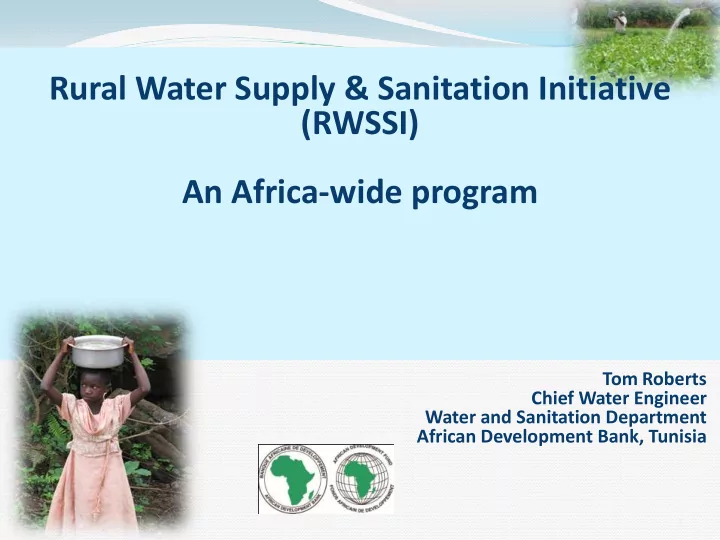

Rural Water Supply & Sanitation Initiative (RWSSI) An Africa-wide program Tom Roberts Chief Water Engineer Water and Sanitation Department African Development Bank, Tunisia 1
RWSSI Framework Concept: to serve the marginalized rural populations Largest RWSS program in Africa Endorsed by African water & finance ministers at 1 st Int’l Conference on Rural Water Supply and Sanitation in Africa (Apr/2005) Goal : accelerate sustainable access to drinking water supply & sanitation Objective: 80% access to W+S to rural Africa by 2015 Targets : water supply - 271 million people improved sanitation - 295 million people Strategy : Demand-responsive programmatic approach, partnership building, increased fund mobilisation, fast tracking, promoting the use of appropriate technology 2
RWSSI: Investment Needs and Financing Plan Investment Needs Financing Plan 0.0955 USD 10.4 billion billion USD 4.4 5% billion USD 15% USD 4 billion 50% 9.7 billion USD 30% USD 95 million Communities Governments AfDB Donors RWSSI Trust Fund mobilised Euro 117 million Donors: Canada, Denmark, France, Netherlands, Switzerland 3
Some Achievements of the RWSSI program RWSSI has: Compliance with Paris Declaration Mobilized about USD 5 billion Progress (June/2011): 31 RWSS National RWSSI programs in 22 countries Program 25 Annual Country Access to improved water supply - Sector System 20 Dialogue for NCB 33.5 million people, improved 15 sanitation - 21.3 million people 10 Country Budget System 5 Support Increased awareness of African for ICB 0 governments and international Annual community on rural WSS needs No Sector Parallel Performa PIU … nce Increased partnership around Common Informati Planning on for RWSSI Framewo National rk Program Supported annual stakeholder sector review 4
RWSSI: Implementation Challenges at Country Level Low priority given to rural water sector Weak country M+E systems Weak capacity to implement & maintain, no supply chains No optimization of partnerships Inadequate focus on long term development benefits 5
RWSSI Implementation Challenges - Paris Declaration Ownership - “the intended beneficiaries must have a direct stake and sense of ownership at all stages, otherwise projects will not be maintained or will become heavy, unwanted burdens.” OECD How do we perceive the poor ? How do we perceive ourselves ? How do these perceptions affect ownership and sustainability of the infrastructure ? 6
The Beneficiary A bundle of problems and needs Suffering from malnutrition and living in weeds Lack of sanitation Little education Poor living quarters No money for orders Unable to join a consumer society No access to modern technology How can such an aggregate of painful ordeals Be expected to offer a solution that appeals ? Beneficiary, Mr Bauleni Banda 7
The Champion Rights – to decide on technology, content of training programs, to have access Responsibility – to think independently, to generate knowledge, to work tirelessly for the project to advance successfully Implications – on sustainability, etc … Protagonist, Mr Bauleni Banda 8
The way forward: more focus on long-term benefits Decentralization • Increase support of decentralization policies more capacity for knowledge generation and decision making at decentralized levels Monitoring & Evaluation • Annual national conference to review the sector or rural sub-sector increased availability of information leading to a common understanding, a more unified vision and greater distribution of decision making • Establish and support existing M+E systems ability to openly compare performance over time by sub-sector + region; encourages greater external scrutiny by exposing RWSS sub sector budgets, leading to internal pressure to reform public financial management Capacity Building • Build capacity in individuals (poor & wealthy), communities, & institutions to decide on selection of RWSS technology and design of RWSS education and communications activities 9
The way forward: strategic focus Mobilize more resources USD 9 billion : 2 nd Int’l Conference on RWSS in Africa at 6 th WWF, April 2011 Campaign for additional funding from traditional and new donor communities (direct bilateral support, joint financing, NGOs, better targeted ODA transfers) Mobilize Euro 300 million for the RWSSI Trust Fund Enhance quality of programme preparation Increase focus on sanitation Strengthen collaboration with development partners Increase use of country systems Align RWSS to climate mitigation and adaptation terms 10
References (online) Framework for Implementation, publisher African Development Bank The Lab the Temple the Market, Chapter 4 by F.Arbab, publisher IDRC Photo credits: Photos of Bauleni Banda on slides 8,9 courtesy of Duncan McNicholl, Malawi Water & Sanitation Team, Engineers without Borders, Canada 11
Thank you!
Recommend
More recommend